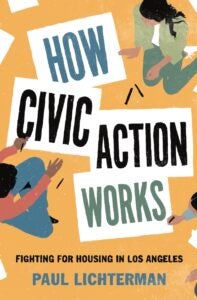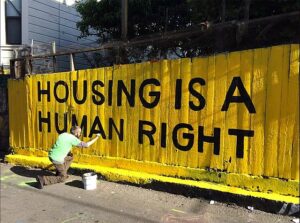About Paul Lichterman
Paul Lichterman is a Professor of Sociology and Religion. His specialty areas include culture, religion, civic organizations and social movements, politics, qualitative methodology, and theory. Below you’ll find some of his recent publications.
If you would like to see other papers from his CV, please e-mail him at lichterm@usc.edu.
 How Civic Action Works: Fighting for Housing in Los Angeles
How Civic Action Works: Fighting for Housing in Los Angeles
The ways that social advocates organize to fight unaffordable housing and homelessness in Los Angeles, illuminated by a new conceptual framework for studying collective action
How Civic Action Works renews the tradition of inquiry into collective, social problem solving. Paul Lichterman follows grassroots activists, nonprofit organization staff, and community service volunteers in three coalitions and twelve organizations in Los Angeles, as they campaign for affordable housing, develop new housing, or address homelessness. Lichterman shows that to understand how social advocates build their campaigns, craft claims, and choose goals, we need to move beyond well-established thinking about what is strategic.
Lichterman presents a pragmatist-inspired sociological framework that illuminates how social advocates grapple with the dilemmas and trade-offs of social problem solving. He reveals that advocates’ distinct styles of collective action produce different understandings of what is strategic, and what is legitimate and appropriate to say about social problems. Different styles of collective action accommodate varying social pressures and generate different dilemmas. Understanding these patterns helps us explain why coalitions fragment when members agree on many things, and what makes advocacy campaigns separate housing from homelessness or affordability from environmental sustainability. Lichterman concludes by turning this action-centered framework toward improving dialogue between social advocates and researchers.
Using extensive ethnography enriched by archival evidence, How Civic Action Works explains how advocates meet the relational and rhetorical challenges of collective action.

From Culture to Claimsmaking
Lichterman, Paul, and Kushan Dasgupta. 2020. “From Culture to Claimsmaking.” Sociological Theory 38(3): 236-262.
How do social advocates make claims about social problems? The usual approaches emphasize either an overarching political culture or else a strategic actor who “frames” problems strategically. Neither helps us get from cultural context to claimsmaking in everyday settings. Taking on that task, we conceptualize how a discursive field is sustained through everyday interaction. Claimsmakers craft claims from basic cultural categories, in line with the appropriate style for a scene of interaction. We show how scene style makes some claims illegitimate in the field, and others either inappropriate or subordinate in a given scene. Our theoretical work illuminates what claimsmakers can say, how, and where. The paper illustrates our argument with evidence from different scenes of a housing advocacy campaign.

Civic Action
Lichterman, Paul and Nina Eliasoph. 2014. “Civic Action.” American Journal of Sociology 120(3): 798-863 (November).
Clifford Geertz Award, American Sociological Association Section on the Sociology of Culture, 2016
Distinguished Contribution to Scholarship Award, American Sociological Association Section on Political Sociology, 2016
Introduces a theoretically grounded, action-centered approach to social movement organizations, volunteer associations, community service projects, and other sites of the civic. Applying the approach to ethnographic cases of a housing activist coalition and a youth services network, the article shows how different scene styles shape different patterns of civic action with different practical outcomes. The article offers several strategies, quantitative as well as qualitative, for aggregating research on styles of civic action. This new approach helps researchers locate and compare civic action in a variety of institutional sectors, and across situations, organizational types, cultural practices or nations.

Theory and Contrastive Explanation in Ethnography
Lichterman, Paul and Isaac Ariail Reed. 2015. “Theory and Contrastive Explanation in Ethnography.” Sociological Methods and Research 44(4): 585-635.
Shows how researchers can use theory to identify causal mechanisms in everyday interaction without sacrificing ethnography’s traditional focus on meanings. Brings ethnographic research into larger conversations about causal explanation in sociology.
 Religion in Public Action: From Actors to Settings
Religion in Public Action: From Actors to Settings
Lichterman, Paul. 2012. “Religion in Public Action: From Actors to Settings.” Sociological Theory 30(1):15-36.
Honorable Mention, Best Article Award, American Sociological Association Section on Sociology of Religion, 2013
Featured article, Homepage, American Sociological Association website, October 2016.
Uses ethnographic comparisons to show what religion research can learn by focusing on settings where people express religious meaning, instead of making religious people the focus of inquiry.

Religion and the Construction of Civic Identity
Lichterman, Paul. 2008. “Religion and the Construction of Civic Identity.” American Sociological Review 73 (February):83-104.
We usually assume that religion matters in public life because it offers motivating, theological reasons for collective action. This article shows how groups also use religion to include or exclude people from collective identities; they may argue bitterly over those religious identities even when they share the same religious reasons for group goals. Evidence from a religious anti-racist coalition and a religious community development project shows subtle ways that religion can promote or impede public collaboration across status or religious differences.
 Culture in Interaction
Culture in Interaction
Eliasoph, Nina and Paul Lichterman. 2003. “Culture in Interaction,” (equally co-authored). American Journal of Sociology 108(4): 735-794.
Best Artice Award, American Sociological Association Section on the Sociology of Culture, 2005
People interpret and act on the same collective representations–symbols, codes and cultural vocabularies–differently in different everyday settings. The differences are not random, but patterned by group styles. Group styles are shared understandings of group membership that “filter” the meaning of collective representations, producing culture in interaction. Drawing on two, extended ethnographic examples, the argument here builds on and contributes to neoinstitutionalism, sociology of emotions, sociolinguistics and studies of the reproduction of inequality.
Contact
Paul Lichterman
Professor of Sociology and Religion
University of Southern California
851 Downey Way, HSH 314
Los Angeles, CA 90089 USA

